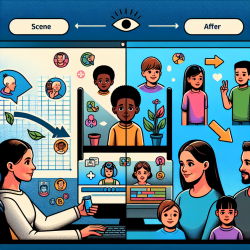The research article titled "The Psychosocial Impact of Congenital Cytomegalovirus on Caregivers and Families: Lived Experiences and Review of the Literature" provides valuable insights into the multifaceted impact of congenital cytomegalovirus (cCMV) on families and caregivers. For practitioners, understanding these impacts can enhance their approach to care and support for affected families. This blog will discuss key findings from the research and suggest ways practitioners can apply this knowledge to improve outcomes for children with cCMV.
Understanding the Psychosocial Impact of cCMV
cCMV is a common cause of sensorineural hearing loss (SNHL) and neurodevelopmental disabilities in children, affecting a significant percentage of live births. The research highlights that caring for a child with cCMV imposes not only direct costs but also significant indirect costs, including caregiver time, mental health, and family dynamics.
Key Findings
- Psychological Impact: Caregivers often experience stress related to their child's past, present, and future health. This includes guilt over perceived prevention failures and ongoing anxiety about their child's development.
- Health of Caregivers: The health of caregivers can deteriorate due to the demands of caring for a child with cCMV, with higher instances of physical and mental health issues reported.
- Family Dynamics: The family system is affected, with siblings and marital relationships experiencing strain. Siblings may feel neglected, and parents may struggle to find time for their relationships.
- Economic Burden: Families face significant financial challenges, from direct medical costs to loss of income due to caregiving responsibilities.
Applying Research to Practice
Practitioners can leverage these findings to enhance their support for families affected by cCMV:
1. Comprehensive Family Support
Provide holistic support that addresses not only the child's medical needs but also the psychological and emotional well-being of the family. This could include counseling services, support groups, and resources for stress management.
2. Education and Awareness
Increase awareness about cCMV among healthcare providers and the general public. Educate parents on prevention strategies and the importance of early diagnosis and intervention.
3. Collaborative Care
Adopt a multidisciplinary approach to care, involving audiologists, speech-language pathologists, occupational therapists, and other specialists to provide comprehensive care plans tailored to each child's needs.
4. Advocacy for Policy Change
Advocate for policies that support families affected by cCMV, such as improved access to early intervention services and financial support for medical expenses.
Encouraging Further Research
While the current research provides a strong foundation, there is a need for further studies to quantify the diverse impacts of cCMV on families. Practitioners can contribute to this body of knowledge by documenting their observations and participating in collaborative research efforts.
To read the original research paper, please follow this link: The Psychosocial Impact of Congenital Cytomegalovirus on Caregivers and Families: Lived Experiences and Review of the Literature.










